
“Myanmar’s digital regime foreshadows SE Asia”
On 15 March 2021, Asia Centre’s Dr. James Gomez and Khin Mai Aung penned an op-ed for Bangkok Post. In the op-ed, the authors discuss how the Junta’s blocking of the internet and media holds consequences for Southeast Asia. The authors argue that the tactics deployed by the junta during the coup do not bode well for the region.
Read the article here

“Myanmar’s troubles signal erosion of democracy in Southeast Asia”
On 3 February 2021, Asia Centre’s Dr. James Gomez and Khin Mai Aung penned an op-ed for the Jakarta Post. In the op-ed, the authors argue that the coup in Myanmar is a sign of democracy’s regression in Southeast Asia. COVID-19 is increasingly being used by authoritarian regimes as an excuse to move against democratic gains acquired by political opponents.
Read the article here
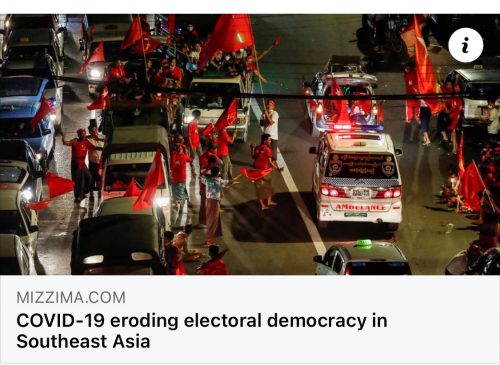
“COVID-19 eroding electoral democracy in Southeast Asia”
On 10 January, Asia Centre’s Dr. James Gomez and Khin Mai Aung wrote an oped for Mizzima News on COVID-19’s impact on Southeast Asia’s electoral democracy. They noted that governments across the region have used the pandemic as an excuse to call off parliament sittings, manipulate the timing of elections to their advantage or declare emergency rule. The article was published in Myanmar 3 weeks before the coup.
Read the article here
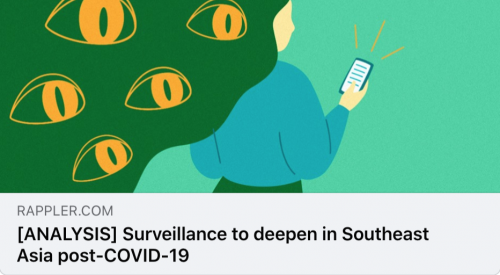
“Surveillance to deepen in Southeast Asia post-COVID-19”
On 15 December 2020, Asia Centre’s Dr. James Gomez and CALD’s Celito Arlegue’s op-ed “Surveillance to deepen in Southeast Asia post-COVID-19” was published in Rappler, Philippines. In the op-ed, the authors highlighted how privacy rights are increasingly infringed as state surveillance regresses democracy and human rights. This was a key concern identified in Asia Centre’s baseline study titled ‘COVID-19 and Democracy in Southeast Asia: Building Resilience, Fighting Authoritarianism.’
Read the article here
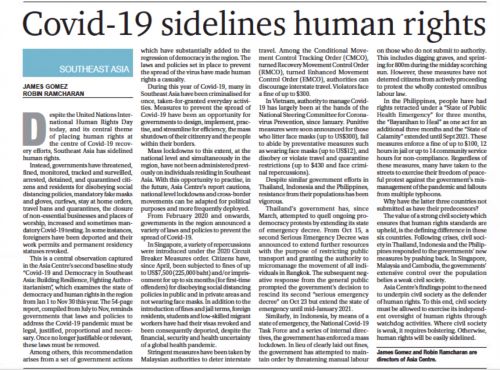
“Covid-19 sidelines human rights”
On 10 December 2020, Asia Centre’s Dr. James Gomez and Dr. Robin Ramcharan’s op-ed titled ‘Covid-19 sidelines human rights’ was published in The Bangkok Post. Despite the United Nations International Human Rights Day today, the authors highlight how Southeast Asia sidelined human rights by government actions substantially adding regression of democracy in the region. The laws and policies set in place to prevent the spread of the virus have made human rights a casualty. This was the central observation in Asia Centre’s baseline study titled ‘COVID-19 and Democracy in Southeast Asia: Building Resilience, Fighting Authoritarianism.’
Read the article here
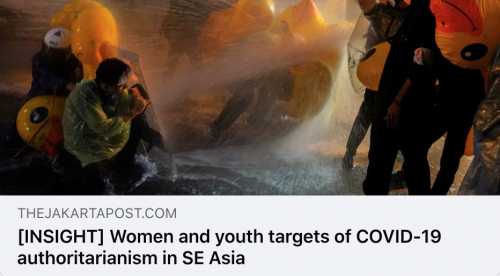
“Women and youth targets of COVID-19 authoritarianism in SE Asia”
On 10 December 2020, for International Human Rights Day, Asia Centre’s Dr. James Gomez and Nukila Evanty’s op-ed “Women and youth targets of COVID-19 authoritarianism in SE Asia” was published in The Jakarta Post. In the op-ed, the authors highlight how COVID-19 has not only accelerated the regression of democracy, but the pandemic has also made women and young activists victims of human rights violations. This emerging phenomenon was examined in Asia Centre’s baseline study titled ‘COVID-19 and Democracy in Southeast Asia: Building Resilience, Fighting Authoritarianism’.
Read the article here
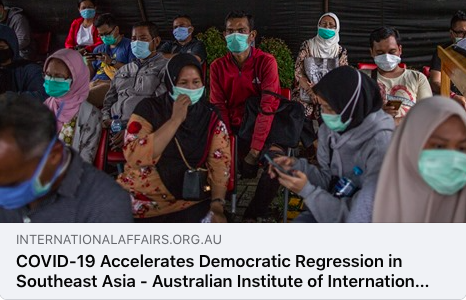
“COVID-19 Accelerates Democratic Regression in Southeast Asia”
On 9 December 2020, Asia Centre’s Dr. James Gomez penned an op-ed for the Australian Institute of International Affairs. In the op-ed he highlighted COVID-19’s role in accelerating the regression of Democracy in Southeast Asia and the risk that authoritarian COVID-19 laws enacted during the pandemic might become long term and shrink civil space. The op-ed was released to mark the launch of Asia Centre’s report “COVID-19 and Democracy in Southeast Asia: Building Resilience, Fighting Authoritarianism” which is found here.
Read the article here
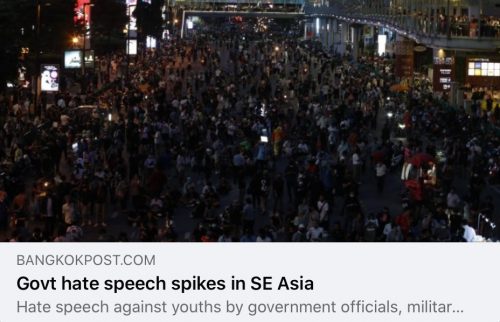
“Govt Hate Speech Spikes in SE Asia”
On 16 October 2020, in the Bangkok Post, Asia Centre’s Dr. James Gomez and Dr. Robin Ramcharan gave their opinion on hate speech in Southeast Asia. They note the spiked infections alongside the spread of COVID-19 through the region. Incidentally, government as an equal purveyor of this spread has been noted by civil society. In this article, they identify this trend in six key countries.
Read the article here.

“Solution to Hate Speech Needs Holistic Approach – James Gomez & Lutfi Hakim”
On 30 September 2020, For the Malaysian portal The Vibes, Asia Centre’s Dr. James Gomez and Lutfi Hakim penned an op-ed on hate speech policy options for Malaysia. They noted, given new forms of hate speech, policy instruments need to take a holistic approach and not focus narrowly on race and religion. This way, the hate speech problem in Malaysia can be better addressed.
Read the article here.

“Why Facebook Suddenly Closed 155 Accounts Targeting The Philippines“
On 28 September 2020 Asia Centre’s Dr. James Gomez gave his opinion in VOA news, On the topic of Facebook deleting accounts who violate policy on coordinated inauthentic behaviour on behalf of a foreign or government entity. He criticises facebook for allowing relatively unfettered access by politicians, hate-speech spreaders and purveyors of fake news in Southeast Asian Countries.
Read the article here.

“Inaction Risks Hate Speech Normalization in Japan“
On August 26 2020, Asia Centre’s Dr James Gomez and Saul J. Takahashi op-ed on hate speech in Japan and Southeast Asia was published in The Jakarta Post. The authors discuss the new forms of hate speech in Japan, the legal measures in place to combat it and highlight the problems posed by government officials and politicians who are adding fuel to the hate speech fire.
Read the article here.
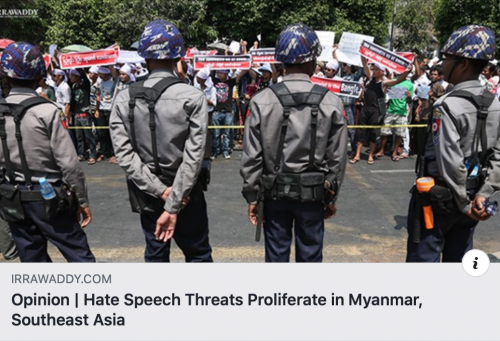
“Hate Speech Threats Proliferate in Myanmar, Southeast Asia“
On 27 July 2020, Asia Centre’s Dr James Gomez and Khin Mai Aung penned an op-ed on hate speech for The Irrawaddy. The piece examines development related to hate speech, not only in Myanmar, but also Southeast Asia. Specific to Myanmar, the article touches on government regulation of hate speech and the inconsistencies in its enforcement, freedom of expression infringement, the roles of the military and government which fuel the spread of hate speech, new forms of hate speech and recommendations to address this problem.
Read the article here.
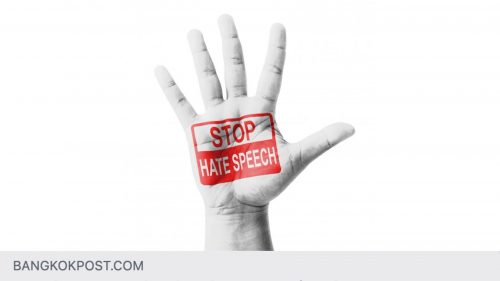
“New Hate Speech Rules Threaten Asian Democracy“
On 18 July 2020, Asia Centre’s Drs James Gomez and Robin Ramcharan in their Bangkok Post commentary discuss how new forms of hate speech are being spread over social media and are impacting democracy in the region. They identify these new forms as hate speech towards foreign nationals such as migrant workers and refugees; members of the LGBTI community; and those with different political values, ideologies and affiliations. These new forms of hate speech and how to address them are further examined in Asia Centre’s 40 page report titled, “Hate Speech in Southeast Asia: New Forms, Old Rules” which is found here.
Read the article here.

“Measures to Combat Hate Speech Should Not Infringe Rights“
On 29 June 2020, Asia Centre’s Dr. James Gomez’s letter was published on On Guard by the Australian Human Rights Institute. In the letter, Dr. Gomez highlighted how there is a spike in hate speech during the COVID-19 pandemic in Southeast Asia as the pandemic is being used to spread misinformation and disinformation against vulnerable communities. This was the key trend in Asia Centre’s baseline study titled ‘Hate Speech in Southeast Asia: New Forms, Old Rules’ launching on 22 July 2020.
Read the article here.
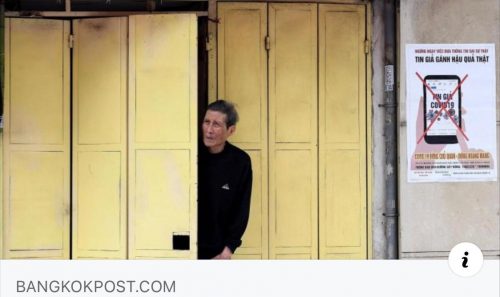
“Covid Crisis Stifles Political Criticism in Southeast Asia”
On 27 May 2020, Asia Centre’s Drs James Gomez and Robin Ramcharan highlighted the threat of fake news laws in the Bangkok Post. They warn that there is a danger that self-censorship of political criticism will become normal in a post-Covid-19 Southeast Asia. They advise that civil society organisations, international institutions and the mainstream media must try to ensure this emerging “new normal” does not take root.
Read the article here.
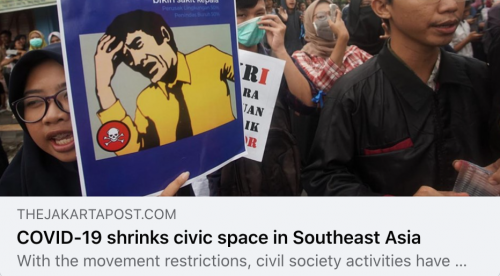
“COVID-19 Shrinks Civic Space in Southeast Asia”
On 25 April 2020, Asia Centre’s Drs James Gomez and Robin Ramcharan caution in the Jakarta Post, “ Limitations on movement, on assembly, on public gatherings and on free speech have severely curtailed the operations of frontline civil society organizations. Recapturing civic space, post-COVID-19, needs to be of deep concern.”
Read the article here.
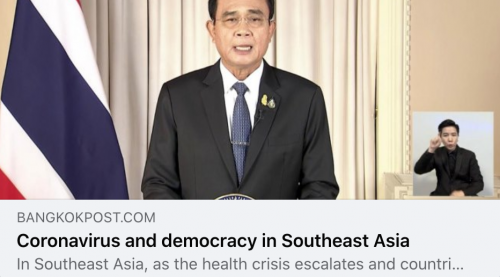
“Coronavirus and Democracy in Southeast Asia“
On 1 April 2020, Asia Centre’s Drs James Gomez and Robin Ramcharan write in the Bangkok Post: ” Coronavirus is affording regimes with authoritarian tendencies the opportunity to suppress political expression, enforce strict obedience and consolidate their rule.”
Read the article here.
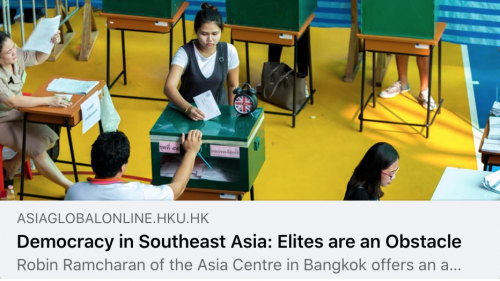
“Democracy in Southeast Asia: Elites Are an Obstacle“

“China Expelled WSJ Journalists Because It Cannot Bear Criticism”
On March 2020, Asia Centre’s Drs James Gomez and Robin Ramcharan had their oped published in Nikkei Asia Review. The authors argue that the international community and media organizations need to strongly condemn Chinese censorship actions and speak up in support of front line media workers.
Read the article here.
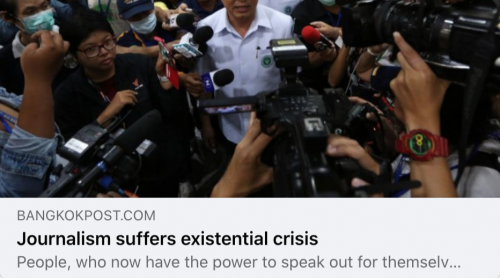
“Journalism Suffers Existential Crisis”
Published on 12 February 2020, read Asia Centre and Oxfam in Asia´s joint Op-Ed written by James Gomez and Nipuna Kumbalathara on how journalism can overcome the industry-wide existential crisis by focusing on issues that matter to people by going back to the basics of what makes a good reporter: curiosity, integrity and boldness.
Read the article here.
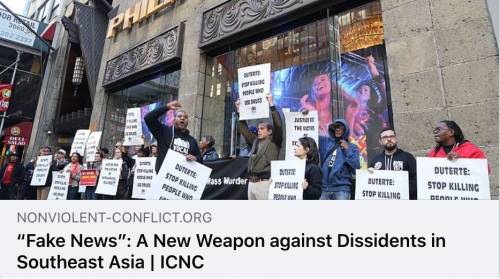
“Fake News”: A New Weapon against Dissidents in Southeast Asia
Dr. Gomez’s oped published on 13 June 2019 for International Centre for Nonviolent Conflict on how Southeast Asian governments are dismissing as “fake news” critical opinions, research findings and news content that are not in line with the government stance.
Read full article here.
